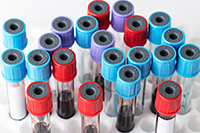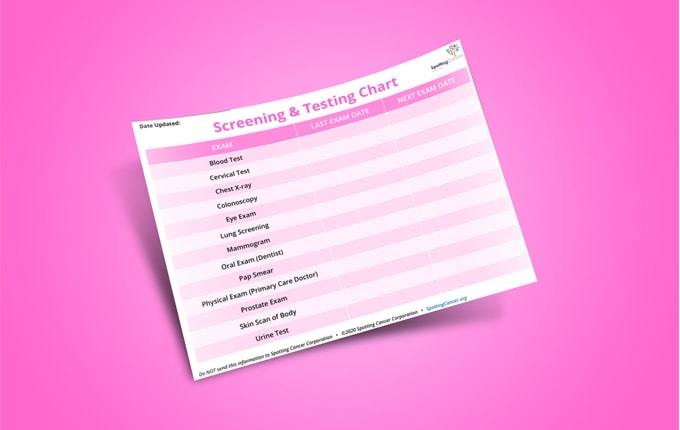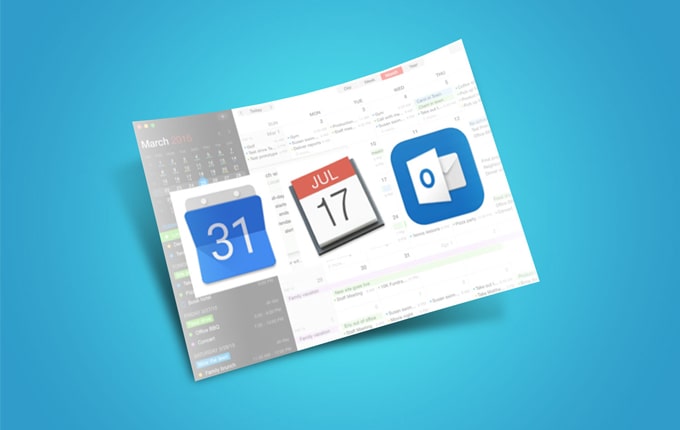Prostate Cancer Exam (92)
Cancer screening & testing helps you #SpotandSurvive
Prostate cancer screenings are offered to men as early as 40 and as late as 75 years old.
The tests discussed below are used to look for the warning signs of prostate cancer. If you receive an abnormal result from one of these tests, you may need a prostate biopsy to determine if you have cancer. There are also non-cancer reasons why the screening test may come back abnormal.
Screening Methods:
There are two tests to detect prostate cancer; no special preparation is required for either test.
- Digital rectal exam (DRE) is an exam of the rectum. The doctor or nurse inserts a lubricated, gloved finger into the lower part of the rectum to feel the prostate for lumps, firmness, asymmetry or anything else that seems unusual.
- Prostate specific antigen test (PSA) is a test that measures the level of PSA in the blood. This is detected from a vial of blood that’s drawn in the doctor’s office and sent to the lab. PSA is a protein made mostly by the prostate that may be found in an increased amount in the blood of men who have prostate cancer. The level of PSA may also be high in men who have an infection or inflammation of the prostate or benign prostatic hyperplasia (BPH—an enlarged, but non-cancerous, prostate).If any abnormalities are detected, a biopsy or ultrasound may be ordered. Sometimes imaging tests, such as CAT scans or MRIs, may also be recommended.
Preparation:
There are no special instructions for this screening.
Download Our Spot and Survive Guides Free Now!
Learn the signs to potentially save yours and your family’s life.
Watch this video to see what happens during a prostate exam.
Source: British Columbia Cancer Agency
When:
Screening tests are given when you have no cancer symptoms. They should be performed on a regular basis, generally once a year when visiting your doctor’s office.
Spot Cancer
Get reminder emails, tips, and resources to develop your spotting cancer habit when you join the Cancer Detection Squad

Take Action
Regular screening & testing is necessary to to spot cancer before it’s too late. Talk to your doctor or medical provider today to learn what cancer screening & testing is right for you.
you can
when you download and use our guides
Get the Screening & Testing Prostate Exam
Download the guide to help you understand how a Prostate Exam works and to learn the best time to schedule a screening. Share with your friends and family to help raise awareness on the importance of early cancer detection.
Get the Screening & Testing Scheduling chart
Download the interactive Screening & Testing Scheduling chart to help you keep track of important screening and testing schedules. Download today!
Save a Body Monitoring and Screening & Testing schedule
Regular monitoring and testing is a life-saving habit. Save a Body Monitoring and Screening & Testing schedule to your Google Calendar or iCalendar to stay on track!
You're on Step 5

Step 1:
Signs & Symptoms
To monitor yourself for early cancer detection, you must know the cancer signs and symptoms. A listing of the various signs and symptoms are just a click away.

Step 2:
Body Monitoring
Cancer grows 24/7. Therefore, you must monitor your body to detect any abnormality between regular doctor visits or screenings. The tools and methods are described in this section.

Step 3:
Family History
Knowing and charting your family medical history will help your medical team as they develop a long-term wellness program suited to your unique needs.

Step 4:
Medical Team
Cancer is not self-healing. Therefore, when spotting a cancer sign or symptom, consider it a red flag that should cause you to consult your medical team immediately to determine if it is cancer or another illness.

Step 5:
Screening & Testing
Not all cancer signs and symptoms are visible. You should establish specific times for the various cancer screening and tests with your medical team.



